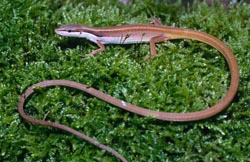- Takydromus sexlineatus
Taxobox | name = Asian Grass Lizard
status =

image_width = 240px
image_caption =
regnum =Animal ia
phylum =Chordata
classis =Reptilia
ordo =Squamata
subordo =Sauria
familia =Lacertidae
genus = "Takydromus "
species = "T. sexlineatus"
binomial = "Takydromus sexlineatus"
binomial_authority = Daudin, 1802
synonyms =
range_
range_map_width = 250px
range_map_caption =The Asian grass lizard, six-striped long-tailed lizard, or long-tailed grass lizard ("Takydromus sexlineatus") is an
arboreal , diurnal species oflizard . The tail length is usually over three times the body (snout to vent) length in this species.Males and females are similar, males being distinguishable by the presence of pre-anal pores. On average they grow to around 8cm (snout-to-vent length), with the addition of a distinctive long tail. Some individuals may have small circular spots on the sides of the bodies.
Like geckos they can drop their tail and grow a new one when attacked.
Appearance
The Long Tailed grass lizard is easily recognized by the long tail. It has a white to cream coloured underbelly with a brown or beige back, often adorned with brown stripes of different shades. It typically has a small head with a sharply pointed snout and black or pink tongue. Its body is slightly elongated and thin with small pointy scales beneath the chin resembling a beard. Some have spots on their flanks.
Distribution
India, China, Burma, Thailand, Laos, Cambodia, Vietnam, Myanmar, Malaysian Peninsula, Indonesia.
Race "ocellatus" is found in S. China, Hainan, Thailand, Laos, Cambodia, Vietnam, N Burma, N Malaysia.
Behavoir
These are entirely diurnal lizards that emerge in the early morning to bask in the sun. If a potential predator approaches they will first remain completely still, and then if the danger persists, they will flee to the safety of foliage. Both sexes use arm waving gestures, (similar to a
front crawl swimming action), apparently to communicate with each other.Diet
"Takydromus sexlineatus" feeds on small insects such as flies, In captivity they can be reared on Crickets and like other small lizards may require a calcium substitute. It is advisable in captivity to vary food including
mealworms , sterilemaggot s or waxworms in addition to crickets although it is possible to feed them garden caught insects. Unlike some larger reptiles, these lizards have extremely fast reactions and have been observed jumping into the air to catch flying prey such as flys.References
* Arnold, E. N. 1997 Interrelationships and evolution of the east Asian grass lizards, "Takydromus" (Squamata: Lacertidae). Zoological Journal of the Linnean Society 119 (2) February, 1997, p 267-296
* Daudin, F. M. 1802 Histoire Naturelle, génerale et particulièredes reptiles, ouvrage faisant suite, a l'histoiure naturelle, générale et particulière composée par LECLERC DE BUFFON, et redigée par C. S. SONNINI, vol. 3. F. Dufart, Paris.
* Ji, Xiang; Wenhui Zhou, Xiaodong Zhang and Huiqing Gu. 1998 Sexual dimorphism and reproduction in the grass lizard Takydromus septentrionalis. Russ. J. Herpetol. 5 (1): 44-48
* Lin, Si-Min; Chaolun Allen Chen and Kuang-Yang Lue 2002 Molecular Phylogeny and Biogeography of the Grass Lizards Genus "Takydromus" (Reptilia: Lacertidae) of East Asia. Molecular Phylogenetics and Evolution 22: 276-288 [erratum in 26: 333]
* Purser, P.A. & Day, S. 2004 The tiniest dragon: the oriental long-tailed grass lizard Takydromus sexlineatus. Reptilia (GB) (33): 67-71
* Schlüter, U. 2003 Die Langschwanzeidechsen der Gattung "Takydromus". Kirschner & Seufer Verlag, 110 pp. [review in Draco 21: 91]
* Ziegler, Thomas, Wolfgang Böhme and Wolfgang Bischoff. 1999 Comments on the grass lizards (Lacertidae:Takydromus) of Vietnam and Myanmar. Hamadryad 24 (1): 39-42.
Wikimedia Foundation. 2010.
